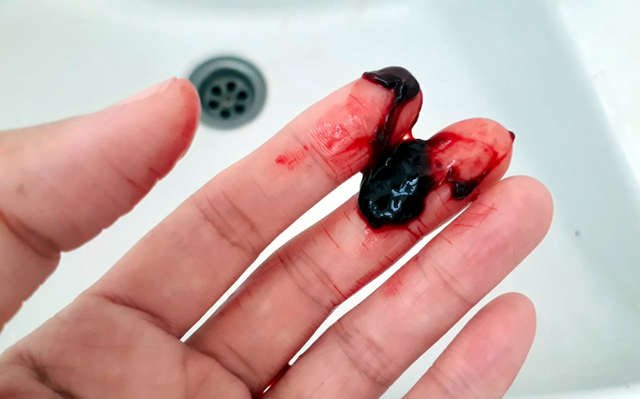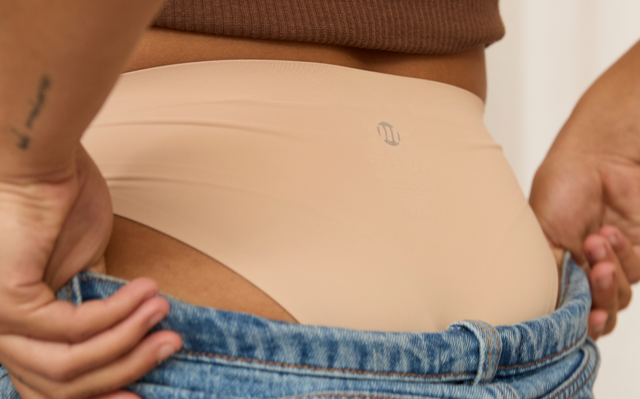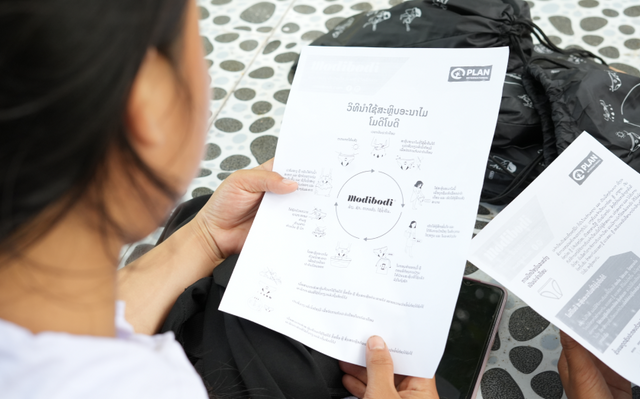Are period blood clots normal and why do they happen?
Just like us, our periods are all unique. Some people are used to experiencing small blood clots in their period, while for others, the first sign of a period blood clot can cause sudden panic.
The good news is, period blood clots are pretty common and are typically no cause for alarm. Even less so with a pair of absorbent period underwear, as clots can usually be wiped off and flushed away. Easy as!
What are period blood clots?
The simple answer: clots are little blobs of coagulated blood and tissue that have been expelled from your uterus during menstruation. Healthline describes them as ‘gel-like’ and resembling ‘stewed strawberries or the clumps of fruit you find in jam’, varying in colour from bright to dark red.
What causes period blood clots?
When your uterine lining sheds, it mixes with blood, tissue and mucus. This then pools at the bottom of the uterus before being expelled through the cervix and out the vagina – that’s what you see as your period.
To help this thickened blood and tissue pass, your body releases anticoagulants. But if your blood flow is faster than your body’s ability to produce these anticoagulants, blood clots in your period are formed. The heavier your period is, the more likely you’ll experience blood clots.
Are period blood clots normal?
In a ‘normal’, healthy cycle, you’ll only see blood clots occasionally. They’ll usually happen at the start of your period and be about the size of a 10-cent coin. If this is you, you likely have nothing to worry about.
However, if you are passing blood clots regularly, it might be a sign of a medical condition that needs treatment. If you’re worried, go visit your doctor to get it checked out.
What medical conditions can cause period blood clots?
While a heavy period is usually the main cause of blood clots, some other conditions may make them more likely or more frequent. These include:
-
Fibroids
Fibroids are muscular tumours (typically not cancerous) that grow in the uterine wall. They can cause heavy or irregular bleeding, pain during sex, lower back pain, fertility problems and a swollen abdomen. As you get older, they become more common.
-
Endometriosis
Endo happens when cells similar to the uterine lining – called endometrial cells – grow outside the uterus where they shouldn’t be. Endometriosis can be debilitating. Often causing painful periods, pain during sex, fertility issues, pelvic pain, abnormal bleeding and sometimes nausea, vomiting and diarrhoea during your period.
-
Adenomyosis
For sufferers of adenomyosis, the uterine lining grows into the uterine wall, causing it to thicken and enlarge. This often leads to longer periods and heavy bleeding.
-
Cancer
Cancer of the reproductive organs is a rare cause of heavy menstrual bleeding.
-
Hormonal imbalance
A common symptom of a hormonal imbalance is irregular periods. They could be more frequent, less frequent, shorter or longer than usual. Off-balance levels of either oestrogen or progesterone can also cause heavy bleeding. This could be caused by perimenopause, menopause, significant weight loss or weight gain, high-stress levels or other menstrual conditions.
-
Miscarriage
Early pregnancy loss – often before you even know you’re pregnant – can cause heavy bleeding, cramps and clotting.
What to do when you’re worried about blood clots?
Dealing with blood clots in your period can be annoying. But it’s easier if you’re wearing a pair of Modibodi period underwear. The super-absorbent lining will absorb extra blood and make sure clots don’t leak out. When you’re ready, you can simply wipe them off or rinse out your pair and pop them in the wash to deal with later.
If period undies don’t do the trick, and your period blood clots are larger than 2cm in diameter, or you’re passing them frequently, then it’s a good idea to seek medical advice.
If there’s any chance you could be pregnant and you’re experiencing blood clots, seek immediate medical attention, as it could indicate a miscarriage.








